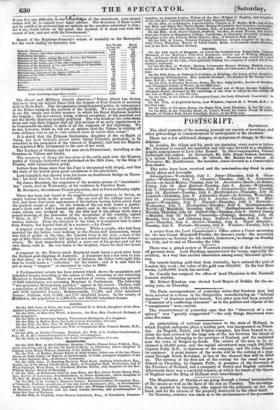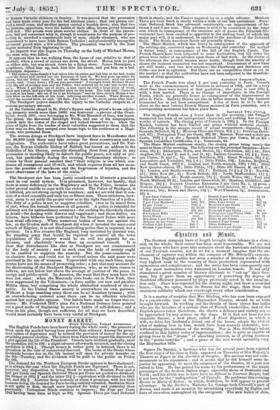The Magistrates of Stockport are going through a formal investigation
of the causes as well as the facts of the riot on Tuesday. The investiga- tion is attended by barristers, who appear for the prisoners on the one hand, and for the owners of the property destroyed on the other hand. On Thursday, evidence was taken as to the circumstances of the procession
or Roman Catholic children on Sunday. It was proved that the procession had been made every year for the last nineteen years ; that one person car- ried a small cross, and another person carried a wooden dove ; also, that two lay persons, apparitors, wore the habits of their office, brown gowns trimmed with red. The priests wore plain secular clothes. In front of the proces- sion, but not connected with it, though it would seem for the purpose of pro- tecting it, marched a considerable body of men, chiefly strangers, who are understood to have been Irish Roman Catholics ; and prominently among this advanced guard were a few soldiers. The procession was not in the least degree molested from beginning to end.
An inquest was also begun on Thursday on the body of Michael Moran, the man who was killed.
It appears that he was walking from the house of one relative to that of another, when a crowd of rioters ran down the street. Moran took no part on either side, but was struck down by a flying stone. James Hannigan, a neighbour, lifted him up, took him into his house, and put him on a bed. Hannigan deposes-
. The rioters, immediately T had taken him up-stairs and laid him on the bed, broke open the doors and carried out the furniture to burn it. We had gone up-stairs for safety, but the Police came In, and an officer from the barracks, with his sword drawn, said, • Come down; I'll see you protected.' I brought down Michael Moran with the aid of another man and the Police, who ordered me to take him to the doc- tor's. When I got him out of doors, a man came up with a large piece of wood, thick and round, and gave him another blow on the head. The man said, • Come let us look at his head, and see if he is an Irishman !' and he then struck Moran a ter- rible blow on the left side of his head, inflicting another wound. When Moran re- ceived the second blow, he said, ' Oh dear, I'm done !' Be never spoke after that." The Stockport papers describe the injury to the Catholic chapels as of serious pecuniary amount. At the Catholic chapel in St. Peter's Square and the priest's house adjoin- ing, property worth more than 10001. was destroyed : a picture of the Cruci- fixion, worth 3001., once belonging to Mr. Weld Blundell of Ince, was burnt. The priest, the Reverend Randolph Frith, and one of his congregation, retired into the tower of the chapel and locked themselves in : when the glare of light from the bonfire of their valuables suggested to them that the tower was on fire, they escaped over house-tops, to the residence of a Magi- strate, who protected them.
The serious doings at Stockport have inspired fears in Manchester that the 80,000 Irish there may take revenge for their countrymen and co- religionists. The authorities have taken great precautions, and Dr. Tur- ner, the Roman Catholic Bishop of Salford, has issued an address to the Catholics of his diocese, earnestly dissuading them from joining in any procession or meeting likely to disturb the public peace, not only at pre- sent, but particularly during the ensuing Parliamentary election ; to evince by their general conduct that " their religion is one which con- demns all resentment and ill-will, and which requires from all her mem- bers the practice of meekness and the forgiveness of injuries, and the strict observance of the laws of the realm."
The Stockport riot has been justly considered to illustrate a practical want in our social system. It is presumed, however, too hastily, that there is some deficiency in the Magistracy and in the Police, because the latter proved unable to cope with the rioters. The Police of Stockport, it is inferred, are not strong enough in numbers; and we are told that it con- sists of a chief constable and only ten or fifteen men. These strictures, how- ever, seem to set aside the proper view as to the right function of a police. The duty of a police is not to suppress rebellion, even in its minor form of riot, when the tumult becomes at all general. A police is intended for ordinary not for extraordinary occasions—for curbing the disorderly classes in detail—for dealing with thieves and vagabonds ; and those duties, we believe, have hitherto been performed by the Stockport Police with more than usual efficiency. When numerous bodies of men rise against the law, as the Gordon mob of Stockport did when it invaded the semi-rural suburb of Edgeley, it is not thief-controlling police that is required, but a garrison. In a free country like England, long unvisited by internal war, the standing army that would be required to control all the town populations of the country would be an evil too gigantic for en- durance, and absolutely worse than an occasional tumult. It is dear diet disturbances like that at Stockport are not countenanced by the body of society ; and in such case the body of society ought to be enabled to suppress the anarchy. But the posse-comitatus is an obsolete force, and could not be revived unless the said posse were practised in the use of weapons. Unprovided with any such force, magi- strates have not the means of preserving order; a fact that may account for the shortcoming of the Stockport Magistrates, who, as we have reason to believe, are not below but above the average of justices of the peace in energy and public-spirit. In America, the want that they must have felt does not exist : when the Macready riots broke out in New York, they were suppressed by the Volunteers,—a force unlike our new and peculiar Militia class, but comprising the whole ablebodied manhood of the re- public. In the United States society is everywhere its own garrison. Without a huge standing army there can be no Austrian tyranny ; with an overwhelming national army there can be no effective rebellion against law and public opinion. Our habits have made us forget this re- source : Mr. Frederick Hill's plan for a National Defence force pointed out a good mode of beginning to recover habits of self-defence ; and a force on his plan, though not sufficient for all that we have described, would most certainly have been very useful at Stockport.



























 Previous page
Previous page